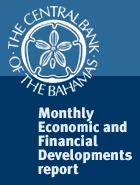| Source: Date: Updated: |
Central Bank of The Bahamas
Friday, April 8, 2016 Friday, April 8, 2016 |
Preliminary evidence suggests that the domestic economy continued to expand at a modest pace during the month of February, reflecting growth in tourism output, while foreign investment-led projects supported activity in the construction sector. Inflationary pressures remained relatively subdued over the review period, as the decline in global oil prices contributed to further reductions in energy costs. On the fiscal front, the overall deficit narrowed considerably in the seven months of FY2015/16, with the value added tax (VAT)-led surge in revenue, outstripping the growth in expenditure. Meanwhile, monetary sector developments in February were dominated by Government’s receipt of proceeds from an external loan, which led to growth in both liquidity and external reserves.
Initial data from the Ministry of Tourism, indicated that the sector maintained its positive growth trajectory in 2015, supported primarily by gains the high value-added stopover segment of the market. Specifically, air arrivals grew by 3.6% to 1.3 million during the year, following a 4.9% expansion recorded in the prior period. However, overall arrivals to The Bahamas declined by 3.3% to 6.1 million, a turnaround from a 2.8% advance in 2014, due to a fall in the larger sea component by 5.1% to 4.7 million, vis-à-vis a 2.2% expansion in the previous year.
By major port of entry, total visitors to New Providence contracted by 7.1% to 3.3 million, reversing the 0.6% uptick in 2014, as a 10.0% reduction in sea passengers outweighed a slight 0.2% rise in air traffic. Similarly, the number of visitors to the Family Islands contracted by 6.7% to 1.9 million, compared to growth of 7.5% in the prior year. This outturn reflected an 8.3% falloff in the sea component, which outstripped the 6.9% gain in air arrivals. In contrast, buoyed by increases in airlift and hotel capacity, arrivals to Grand Bahama firmed by 22.9% to 1.0 million, outpacing the previous 0.9% upturn, as both air and sea traffic surged by 24.9% and 22.5%, respectively.
Reflecting in part the imposition of the VAT on a wide range of goods and services on January 1st, domestic inflation—as measured by the All Bahamas Retail Price Index—firmed by 70 basis points to 1.88% in 2015. Specifically, average price gains for health and recreation & culture accelerated by 13.6 and 7.1 percentage points to 15.4% and 10.8%, respectively. In addition, inflation rates quickened for clothing and footwear (by 5.4 percentage points to 5.4%), furnishing, household equipment & maintenance (by 5.0 percentage points to 6.6%), communication (by 4.6 percentage points to 5.0%), food & non-alcoholic beverages (by 4.3 percentage points to 5.9%), and restaurant and hotels (by 4.0 percentage points to 5.9%). More modest accretions to average price gains of less than 3.0 percentage points were registered for education, alcohol beverages, tobacco & narcotics and miscellaneous goods & services. In a modest offset, transportation costs declined to 5.4%, a reversal from a 3.7% advance in the prior year, attributed to the decline in global oil prices, while the average cost for housing, water, gas electricity & other fuels—the largest component in the index—contracted further, by 1.4%, after a 0.3% decline in 2014.
Domestic energy costs continued to reflect the sharp fall in international oil prices, as The Bahamas Electricity Corporation’s fuel charge decreased by 19.5%, on a monthly basis, to 8.38 cents per kilowatt hour (kWh) in February, while in comparison to the previous year, prices were 61.9% lower.
During the seven months of FY2015/16, the overall deficit narrowed by $83.3 million (28.4%) to $210.1 million, as revenue firmed by $212.3 million (25.6%) to $1,042.2 million, outpacing the $129.0 million (11.5%) expansion in expenditure to $1,252.3 million. A seasonal acceleration in VAT and business license collections over the rest of the fiscal year—particularly during March and April—should produce a more marked consolidation in the overall fiscal year deficit. Measures to streamline administration and broaden the base, boosted tax revenue by $217.4 million (30.2%) to $936.1 million through end-January 2016, with VAT receipts comprising 40.5% of the total at $379.1 million. In contrast, reflecting the decline in several tariff rates to compensate for the new regime, taxes on international trade fell by $40.7 million (12.1%) to $295.4 million, as both import duties and excise taxes decreased. With most property transfer taxes replaced by VAT, other “miscellaneous” taxes contracted by $57.1 million (19.6%) to $234.0 million, while business & professional fees moved lower by $37.7 million (61.5%) to $23.6 million, due largely to deferred collections. Further, selective taxes on services fell by two-thirds to $10.3 million, due to the elimination of the hotel occupancy tax category. In addition, non-tax receipts decreased by $2.2 million (2.0%) to $105.9 million, owing mainly to a $3.3 million (4.3%) reduction in fines, forfeits and administration fees, which overshadowed slight increases in the other categories.
On the expenditure side, current spending expanded by $173.7 million (17.9%) to $1,144.6 million, explained in large measure by a $135.5 million (30.6%) increase in transfer payments. Specifically, the reclassification of flows to public corporations from net lending to transfers, resulted in subsidies and other transfers advancing by $122.8 million (41.8%) to $416.2 million. In addition, interest payments rose by $12.7 million (8.6%) to $161.6 million. Similarly, purchases of goods and services rose by $26.6 million (17.7%) to $177.0 million, with the most significant gains occurring for rent, communication & utilities and for other contractual services. In addition, wages & salary outlays rose modestly by $11.6 million (3.1%) to $389.7 million. In contrast, capital spending declined marginally by $0.7 million (0.6%) to $105.3 million, due mainly to a reduction in asset acquisitions. Further, following the reclassification exercise, net lending declined by $44.1 million to $2.4 million.
For full text reading, please download the attached document.
Source: Central Bank of TheBahamas.










 Download MEFD February
Download MEFD February
